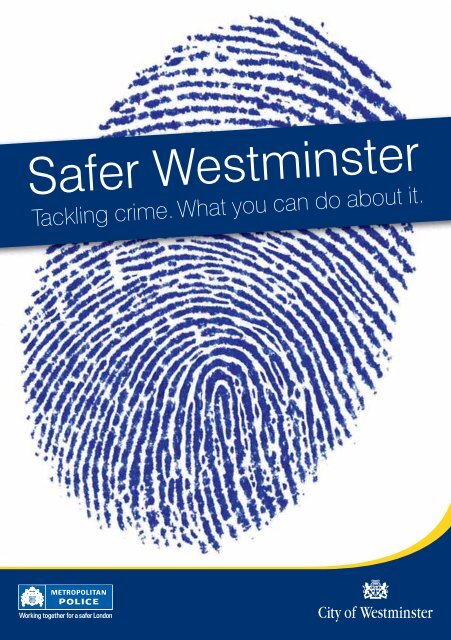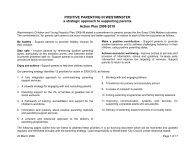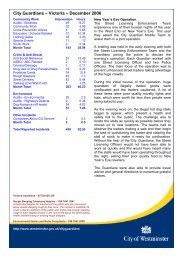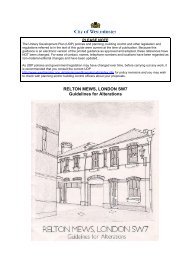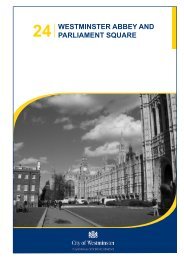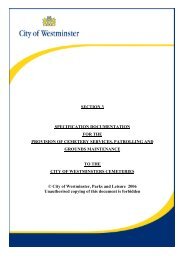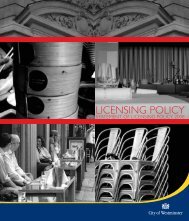Untitled - Westminster City Council
Untitled - Westminster City Council
Untitled - Westminster City Council
You also want an ePaper? Increase the reach of your titles
YUMPU automatically turns print PDFs into web optimized ePapers that Google loves.
Introduction<br />
Crime is one of the biggest concerns for people living in <strong>Westminster</strong>.<br />
In our most recent survey, 36% of you said it was the most important<br />
issue for your local area.<br />
Because of this, we’ve introduced a number of new initiatives over recent years,<br />
which are already helping to reduce crime and disorder. However, we also<br />
thought it would be useful to tell you what we’re doing and how you can help.<br />
The fear of crime can sometimes overshadow the problem of crime itself. Some<br />
people, particularly the vulnerable and elderly, may feel unsafe leaving their home<br />
which can really affect their quality of life. By giving people the facts behind the<br />
myth and hype surrounding crime and correcting some popular misconceptions,<br />
we hope to help you understand and reassure you about this important issue.<br />
In this booklet, we’ve included information on:<br />
• the main causes of crime and what’s being done to tackle them<br />
• how you can help prevent crime and report it<br />
• the most frequently asked questions about crime<br />
• details on the level of crime in your local area<br />
• what to do if you’ve been a victim of crime<br />
• useful contact details and addresses.<br />
We hope you’ll fi nd it useful.<br />
Simon Bray<br />
Metropolitan Police<br />
Borough Commander<br />
Daniel Astaire<br />
Cabinet Member for<br />
Community Safety<br />
2
Crime. An introduction<br />
Firstly, the most important fact you need to know about crime in <strong>Westminster</strong><br />
is that it has been going down. In fact, crime has dropped by almost a quarter<br />
over the last 8 years, as the graph below shows.<br />
100,000<br />
90,000<br />
80,000<br />
70,000<br />
60,000<br />
50,000<br />
40,000<br />
30,000<br />
20,000<br />
10,000<br />
0<br />
2000-01 2001-02 2002-03 2003-04 2005-06 2006-07 2007-08 2008-09 2009-10<br />
Total offences in <strong>Westminster</strong> per year<br />
Source: Metropolitan Police<br />
At the time this guide was printed:<br />
• there were on average only 5 personal<br />
robberies each day among a daytime<br />
population of 1.2 million people<br />
• last year there were 1,484 burglaries<br />
for the 120,000 households in<br />
<strong>Westminster</strong><br />
• there was one reported violent<br />
incident per 42,600 people per day.<br />
So, as you can see, crime takes place<br />
more rarely than you might think.<br />
However, we’re not saying that crime<br />
doesn’t happen. And when it does, it can<br />
be extremely traumatic. If you’ve been a<br />
victim of crime, we’ve included contact<br />
details on page 15 explaining where to<br />
seek support.<br />
To see the most up to date crime fi gures for <strong>Westminster</strong><br />
throughout the year and compare them with other parts of<br />
London, visit met.police.uk/crimefigures.<br />
3
The causes of crime<br />
To parrot a well-known phrase, crime-fighting isn’t just about being tough on<br />
crime but also tough on the causes of crime. But what are these causes of crime<br />
Naturally, the reasons for crime vary<br />
depending on the type of offence and<br />
the relationship is often complex. For<br />
example, when the economy declines,<br />
you might expect to see a rise in credit<br />
card fraud, whereas assault is more<br />
closely linked to alcohol consumption.<br />
Drug abuse is also another wellpublicised<br />
factor, as is lack of education<br />
and unemployment.<br />
the Family Recovery Programme,<br />
where <strong>Westminster</strong> <strong>City</strong> <strong>Council</strong> identifi es<br />
families struggling with social problems<br />
and provides support to help them<br />
achieve a better quality of life and avoid<br />
falling into a persistent life of crime.<br />
Other initiatives include ‘<strong>Westminster</strong><br />
Works’, whereby <strong>Westminster</strong> <strong>City</strong><br />
<strong>Council</strong> has helped people back into<br />
work, as well as the ‘<strong>City</strong> Recovery’<br />
programme where over £100 million is<br />
being spent on projects to fund, support<br />
and enhance economic development.<br />
Also we have a number of schemes<br />
to provide positive activities for young<br />
people and help youth offenders get<br />
back on track.<br />
Many of these are deeply entrenched<br />
social issues which require complex<br />
solutions that don’t happen overnight.<br />
Because of this, it’s very important that<br />
both <strong>Westminster</strong> <strong>City</strong> <strong>Council</strong> and the<br />
Metropolitan Police work together as,<br />
although it’s the police’s duty to catch<br />
criminals, it’s the council’s role to create<br />
an environment which discourages crime<br />
in the fi rst place.<br />
A number of projects are being carried<br />
out to deal with these deeper underlying<br />
issues. One of the most prominent is<br />
It’s the council’s role to<br />
create an environment<br />
which discourages crime<br />
in the fi rst place.<br />
Because solving these problems<br />
involves co-operation between many<br />
different local organisations, we’ve set<br />
up the Safer <strong>Westminster</strong> Partnership to<br />
ensure all the relevant people, including<br />
the council, police, schools, social<br />
workers and criminal justice system, are<br />
working together to help stop crime.<br />
4<br />
To fi nd out about these programmes, simply visit<br />
westminster.gov.uk and type ‘Family Recovery’,<br />
‘<strong>City</strong> Recovery’ or ‘<strong>Westminster</strong> Works’ into the search box.
Family Recovery Programme<br />
The Smith family have suffered from<br />
problems including lack of home routine,<br />
poor school attendance and domestic<br />
violence as well as signifi cant debt and<br />
issues with benefi ts. Their behaviour<br />
has also had a serious impact on their<br />
neighbours and the wider community.<br />
The Family Recovery team built a plan<br />
to specifi cally target these problems.<br />
Included in the plan were:<br />
• a behaviour reward system for<br />
the children<br />
• a parenting strategy to help improve<br />
the children’s school performance<br />
and behaviour at home<br />
• domestic violence workers working<br />
with family members<br />
• debt support and advice about the<br />
possibility of considering bankruptcy<br />
proceedings<br />
• agreed sanctions if they do not work<br />
to improve their behaviour.<br />
Measures such as these not only help<br />
the family, but also reduce the risk of<br />
crime and anti-social behaviour in the<br />
local community.<br />
Please note names have been changed<br />
to protect the privacy of the family<br />
involved.<br />
The project’s fantastic<br />
and the team’s been<br />
really helpful. Things<br />
have really changed for<br />
us since we got involved<br />
in the programme.<br />
Jane Smith<br />
For more information on the Family Recovery Programme,<br />
contact the project team on 020 7641 5871/5847.<br />
5
What’s being done<br />
As mentioned earlier, one way to prevent crime is through broad economic and<br />
social programmes, but there are practical things which can be done too. One of<br />
the simplest is to make sure people know how to make it difficult for criminals to<br />
commit a crime and easier for the police to investigate if a crime does take place.<br />
We do this by sending specialist<br />
teams around <strong>Westminster</strong> to help and<br />
advise residents, focussing on specifi c<br />
crimes. For example, a recent session<br />
in Bayswater focused on residential<br />
burglary. The teams marked property<br />
Andy Rowell,<br />
Chief Superintendent<br />
such as mobile phones and MP3<br />
players with ultraviolet pens, gave out<br />
DNA smart water kits for residents and<br />
gave demonstrations of how common<br />
street crimes are perpetrated and how<br />
to stop them.<br />
We work around the clock to keep <strong>Westminster</strong><br />
safe, reducing and preventing crime as well as<br />
working with the council to deal with community<br />
problems and concerns. The local residents and<br />
businesses play a vital role in helping us to target<br />
the work we’re doing and ensure we’re tackling the<br />
issues that matter to them.<br />
6
Another simple way to keep crime<br />
down is to make sure people can<br />
get information when they need it.<br />
Community Safe is a text and email<br />
advice and information service on crime<br />
reduction provided by the police and<br />
local councils,that provide real time<br />
details of incidents taking place in the<br />
city which you may wish to avoid. You<br />
can fi nd out how to receive updates<br />
direct to your phone or email by visiting<br />
communitysafe.gov.uk.<br />
Catching criminals once a crime has<br />
been committed is one thing, but it’s<br />
better to intervene before the crime<br />
takes place. CCTV helps us do this.<br />
In <strong>Westminster</strong>, we have a state of the<br />
art system, with cameras strategically<br />
placed across the city and links to local<br />
police and <strong>City</strong> Guardians to ensure we<br />
can respond rapidly when we need to.<br />
However, cameras aren’t a substitute<br />
for good, solid information. So if you’re<br />
concerned about a security issue in<br />
your area, you can call the Community<br />
Intelligence line on 020 7641 3000 or visit<br />
westminster.gov.uk/streetproblems.<br />
Since 2002, CCTV<br />
operators have<br />
monitored and recorded<br />
over 24,000 separate<br />
incidents, of which more<br />
than 12,000 have led<br />
to an immediate police<br />
or council response.<br />
More than 6000 of these<br />
incidents have led to<br />
intervention, injunction<br />
or arrest.<br />
7
What’s being done<br />
Another successful scheme has been Community Payback. It gives offenders<br />
the opportunity to “payback” the local community by carrying out unpaid work.<br />
As well as improving local areas, the<br />
initiative teaches offenders life skills to<br />
help prevent them from re-offending.<br />
Re-offending rates for offenders involved<br />
in the scheme were down 15% between<br />
2007/8 and 2008/9.<br />
As well as the police offi cers who<br />
regularly patrol throughout <strong>Westminster</strong><br />
and the specialist teams that support<br />
them, there are also 26 borough Safer<br />
Neighbourhoods Teams (SNTs). SNTs<br />
comprise of a dedicated team of police<br />
offi cers and community support offi cers<br />
working closely with the local community.<br />
These teams work to tackle issues<br />
chosen by a ward panel made up of local<br />
residents and businesses, as well as<br />
regularly updating them on progress. This<br />
helps you have a real say in what happens<br />
in your area, and means that we can focus<br />
on the problems that matter to you.<br />
To fi nd out how to join your local ward panel,<br />
visit met.police.uk/teams/westminster<br />
Some are quite popular and space is limited, so you might have to wait.<br />
Our apologies if this is the case.<br />
8<br />
Find contact details for your local Safer Neighbourhoods<br />
Team on pages 12 and 13, or read more by visiting<br />
met.police.uk/saferneighbourhoods<br />
If you’d like to nominate a project for the Community<br />
Payback Scheme to take on, call the Crime and Disorder<br />
Reduction Service on 020 7641 1085.
There are 12 <strong>City</strong> Guardian teams who provide a visible, local service –<br />
helping keep <strong>Westminster</strong> safer and cleaner by patrolling the street.<br />
Interview with a <strong>City</strong> Guardian<br />
from Pimlico<br />
What is a <strong>City</strong> Guardian’s role<br />
The main role of the <strong>City</strong> Guardians is<br />
to provide a reassuring presence for<br />
residents and reduce the effects of<br />
anti-social behaviour. For example,<br />
we work with schools and youth clubs<br />
to deal with any potential anti-social<br />
behaviour and tell them about the<br />
sports and activities available across<br />
the city. Because we work so closely<br />
with the community, we are often<br />
given information that is unavailable<br />
to other agencies. This allows us to<br />
intervene at an early stage and deal<br />
with problems before they arise.<br />
How can residents help<br />
By reporting any problems you have<br />
experienced concerning crime or antisocial<br />
behaviour in your area.<br />
How can residents get in touch<br />
You can speak to us in person out on<br />
the street, or visit westminster.gov.uk/<br />
cityguardians to fi nd out more.<br />
9
Ways to protect<br />
yourself from crime<br />
Remember most criminals are opportunists. Burglars don’t need a second<br />
invitation to walk through an open door or window and take their chance.<br />
So when you go out, lock all doors and windows, even if you’re only going<br />
out for a few minutes.<br />
• If you are installing new doors and<br />
windows, get ones that are certifi ed to<br />
British Standard BS7950 (windows) or<br />
PAS 24-1 (doors)<br />
• The fi rst place a criminal will check is<br />
for spare keys in a garage, shed or<br />
near the door. Make sure you do not<br />
leave spare keys nearby and do not<br />
assume they will not be found<br />
• Think about having your car windows<br />
etched with the registration number<br />
or the last 7 digits of your Vehicle<br />
Identifi cation Number (VIN)<br />
• Register the serial numbers of<br />
valuable property at immobilise.com.<br />
This national database is used by<br />
police and increases the chance of<br />
your items being recovered<br />
• If you get an abusive or threatening<br />
phone call, do not respond to it.<br />
The caller wants a strong reaction<br />
from you. If you are receiving<br />
abusive calls, contact your phone<br />
company or the police for help<br />
• Always carry your wallet in an inside<br />
pocket, not an outside one where it<br />
is in full view<br />
• If there is a sudden commotion,<br />
be extra vigilant. Incidents can<br />
be staged to distract you while<br />
a pickpocket is searching for<br />
your wallet<br />
• Don’t leave anything visible in<br />
your car. Even a jacket can look<br />
inviting to a thief. Leaving the<br />
glovebox empty and open will<br />
make it obvious to a criminal that<br />
there is nothing worth taking<br />
• Never store your car’s documents<br />
in the car.<br />
10
Frequently asked<br />
questions<br />
The media says crime is going up and<br />
you say it’s going down. Who’s right<br />
Pretty much everyone gets their<br />
information from the newspapers or<br />
television. However, because the media<br />
tend to focus on big one-off stories,<br />
this can give the impression that lots<br />
of crime is taking place when this isn’t<br />
the case. Also, there may be a focus<br />
on a particular type of crime, which<br />
may obscure drops in crime levels<br />
elsewhere. As mentioned on page 3,<br />
you can decide for yourself by visiting<br />
met.police.uk/crimefigures.<br />
How does <strong>Westminster</strong><br />
compare to the rest of<br />
the country<br />
Very favourably. Although<br />
overall volumes of some<br />
crime types are high in<br />
absolute terms, when you<br />
take into account the million<br />
visitors every day, it is still<br />
one of the safest cities in<br />
the world. The chances of<br />
becoming a victim of crime<br />
are low, especially if you<br />
follow the precautions listed<br />
on page 10.<br />
How much crime is unreported<br />
Evidence from the British Crime Survey<br />
suggests that as much as 50% of all crime<br />
goes unreported nationally. This differs<br />
between crime types. Also some groups<br />
of people seem more likely than others<br />
to report a crime. However, the survey<br />
does not include young people under 16<br />
and only covers household and personal<br />
crime, not commercial crime. We would<br />
encourage anyone who has been a victim<br />
of crime or antisocial behaviour to report it<br />
using the contacts on page 16.<br />
Can you trust crime statistics<br />
Yes. The statisticians who compile the<br />
information do so with honesty and<br />
integrity. However, no single indicator<br />
can ever tell the whole story and this<br />
complexity is often ignored in people’s<br />
search for straightforward answers.<br />
Unsurprisingly, this often leads to public<br />
confusion. We try to use a rounded<br />
selection of information on which to base<br />
decisions, including public engagement<br />
through Safer Neighbourhoods Ward<br />
Panels, to ensure we focus on the priorities<br />
that really matter to local people. To see<br />
how you can get involved see page 8.<br />
11
Number of crimes<br />
in <strong>Westminster</strong><br />
6<br />
Regent’s<br />
Park<br />
3<br />
5<br />
4<br />
7<br />
Police Stations<br />
1. Belgravia<br />
202-206 Buckingham Palace<br />
Road SW1W 9SX<br />
2. Charing Cross<br />
Agar Street WC2N 4JP<br />
3. Harrow Road Police Station<br />
325 Harrow Road W9 3RD<br />
4. Marylebone<br />
1-9 Seymour Street W1H 7BA<br />
5. Paddington Green<br />
2-4 Harrow Road W2 IXJ<br />
6. St John’s Wood<br />
20 Newcourt Street NW8 7AA<br />
(Only open 9-5)<br />
7. West End<br />
27 Savile Row W1S 2EX<br />
Kensington<br />
Gardens<br />
Hyde<br />
Park<br />
1<br />
12
Total number<br />
of crimes<br />
517 – 723<br />
724 – 1318<br />
1319 – 2028<br />
2029 – 3435<br />
3436 – 6011<br />
6012 – 9060*<br />
2<br />
SNT Landline Mobile<br />
Abbey Road 020 8721 2462 07920 233897<br />
Bayswater 020 8721 2412 07920 233948<br />
Bryanston and<br />
Dorset Square<br />
020 8721 2461 07920 233898<br />
Cavendish Square<br />
and Oxford Market<br />
020 8721 2414 07920 233946<br />
Church Street 020 8721 2098 07843 065924<br />
Churchill 020 8721 2805 07810 834698<br />
Covent Garden 020 8721 2416 07920 233944<br />
Harrow Road 020 8721 2739 07768 178175<br />
Hyde Park 020 7321 9313 07768 178187<br />
Knightsbridge and<br />
Belgravia<br />
020 8721 2422 07920 233938<br />
Lancaster Gate 020 7321 9383 07768 178152<br />
Little Venice 020 8721 2411 07920 233949<br />
Maida Vale 020 8721 2410 07920 233950<br />
Marylebone<br />
High Street<br />
020 7321 8797 07920 233899<br />
Mayfair and St James’s 020 8721 2419 07920 233941<br />
Oxford Street, Regent’s<br />
St and Bond Street<br />
020 8721 2413 07920 233947<br />
Queen’s Park 020 8721 2410 07920 233950<br />
Regent’s Park 020 8721 2463 07920 233896<br />
Soho 020 8721 2418 07920 233942<br />
Strand and Whitehall 020 8721 2415 07920 233945<br />
Tachbrook 020 8721 2421 07920 233939<br />
Victoria Business 020 7321 6916 (dual purpose)<br />
Vincent Square 020 8721 2876 07810 857227<br />
Warwick 020 8721 2420 07920 233940<br />
West End and<br />
China Town<br />
020 7321 7726 07920 233943<br />
Westbourne 020 8649 3602 07843 065925<br />
*Please note: The level of crime in the centre of the city is due to<br />
the high volume of visitors. With over a million people visiting the<br />
centre of London a day, it is expected that crime fi gures will be<br />
proportionately higher than in a residential area.<br />
13
Reporting crime<br />
If you see or want to report a crime,<br />
the relevant numbers are included on<br />
the back of this booklet. However,<br />
if you don’t need an urgent response,<br />
some crimes can be reported via the<br />
net. Visit https://online.met.police.uk<br />
for details.<br />
However, some crime is less obvious<br />
and happens beind closed doors. This<br />
often takes the form of vulnerable adults<br />
or children suffering abuse or neglect.<br />
Because these people may not be<br />
able to leave their house, this can be<br />
exceptionally diffi cult to identify. As the<br />
crime is often very serious, any help you<br />
can provide is critical. Even something<br />
as simple as keeping an eye on your<br />
neighbours can make a big difference.<br />
14<br />
If you suspect a child<br />
or young person is being<br />
harmed through abuse<br />
or neglect, contact<br />
020 7641 7560 or visit<br />
westminster.gov.uk/<br />
safeguardingchildren.<br />
If you suspect an adult is<br />
suffering through abuse or<br />
neglect, call 020 7641 2176<br />
or visit westminster.gov.uk/<br />
safeguarding.
You can get involved directly in tackling crime in your local area, either through<br />
the CivicWatch Citizens or Neighbourhood Watch programme, as well as the<br />
ward panels mentioned on page 8.<br />
Neighbourhood<br />
Watch<br />
Neighbourhood Watch is about<br />
neighbours joining together to:<br />
• support local crime prevention<br />
initiatives<br />
• distribute local crime information<br />
and advice<br />
• provide intelligence to the police on<br />
criminal and anti-social activities<br />
• lobby councils and other local<br />
agencies for improvements to<br />
their area.<br />
If you are interested in getting involved<br />
with your local Neighbourhood Watch<br />
group, call 020 7641 2117.<br />
CivicWatch<br />
The CivicWatch Citizens project<br />
encourages residents to report anything<br />
from youth disorder, street drinking<br />
and begging to more environmental<br />
concerns such as graffi ti, noise<br />
nuisance, fl y tipping and dog fouling.<br />
Monthly feedback is sent to update<br />
people on action that has been taken<br />
to deal with their concerns.<br />
For more information on how<br />
to become a CivicWatch Citizen,<br />
call 020 7614 1007 or email<br />
CivicWatchCitizen@westminster.gov.uk.<br />
Victim Support<br />
If you are unfortunate enough to be<br />
a victim of crime, Victim Support<br />
<strong>Westminster</strong> helps people who have<br />
been affected by crime, through<br />
providing confi dential support and<br />
information to victims and to witnesses<br />
attending courts. This service is free,<br />
independent of the courts and police<br />
and is available to anyone.<br />
You can call the National Support<br />
Line 0845 303 0900, Victim Support<br />
<strong>Westminster</strong> 020 7828 4142 or email<br />
general@vswestminster.org.<br />
15
Contact numbers<br />
Metropolitan<br />
Police numbers<br />
Emergencies<br />
999 in the case of an emergency<br />
18000 (text phone) if you are deaf<br />
or have a speech impairment<br />
Remember 999 is only for real<br />
emergencies. Seven out of 10 calls it<br />
gets are non-emergency, so please<br />
use the number below where possible.<br />
Non-emergency situations<br />
0300 123 1212 for Metropolitan<br />
Police non-emergency support<br />
18001 0300 123 1242<br />
(text phone) if you are deaf or<br />
have a speech impairment<br />
Local policing issues<br />
Call your Safer Neighbourhoods Team<br />
using the numbers on pages 12 and 13<br />
<strong>Westminster</strong> <strong>City</strong><br />
<strong>Council</strong> numbers<br />
Environmental Action Line<br />
020 7641 2000 to report concerns over<br />
noise, graffi ti, dumping of waste or<br />
damage to pavements or street lighting<br />
Crime and Disorder Reduction<br />
Service<br />
020 7641 1085 for general queries<br />
about the council’s community<br />
protection activities<br />
<strong>Westminster</strong> <strong>City</strong> <strong>Council</strong><br />
020 7641 6000 for the council’s main<br />
switchboard service<br />
Family Information Service<br />
020 7641 7929 for details of services<br />
and support for parents, carers,<br />
families, children and young people<br />
Other numbers<br />
Victim Support <strong>Westminster</strong><br />
020 7828 4142 for confi dential support<br />
and advice for victims of crime<br />
Crimestoppers<br />
To offer information anonymously, call<br />
free on 0800 555 111<br />
Please visit the <strong>Westminster</strong> website at westminster.gov.uk to fi nd out more about<br />
the council and its activities. You’ll fi nd detailed and up-to-date information and<br />
any documents you might need, such as anti-social behaviour reporting forms.<br />
We hope you’ve found this guide useful. If you’d like to comment on it,<br />
email Civicwatch@westminster.gov.uk


